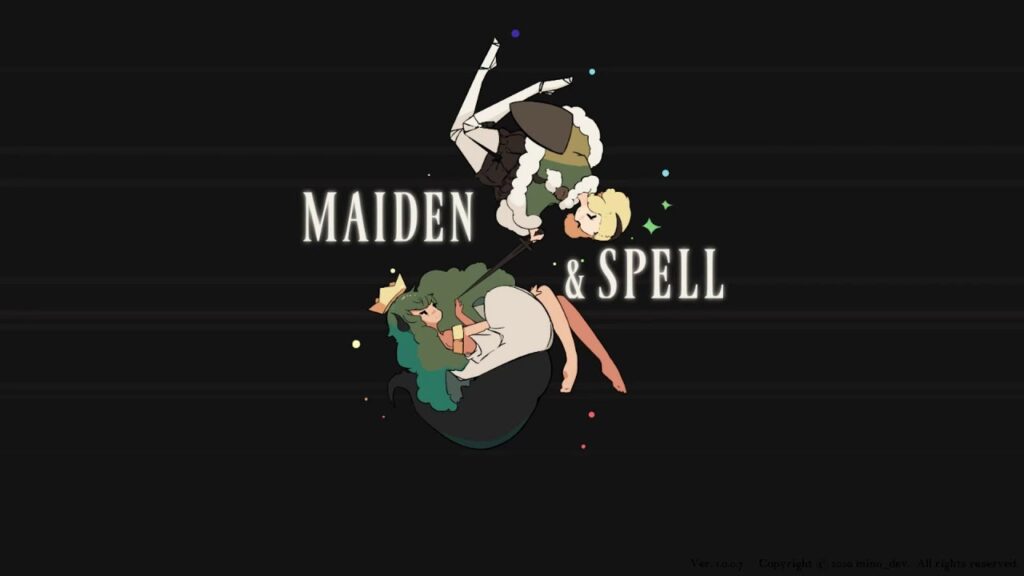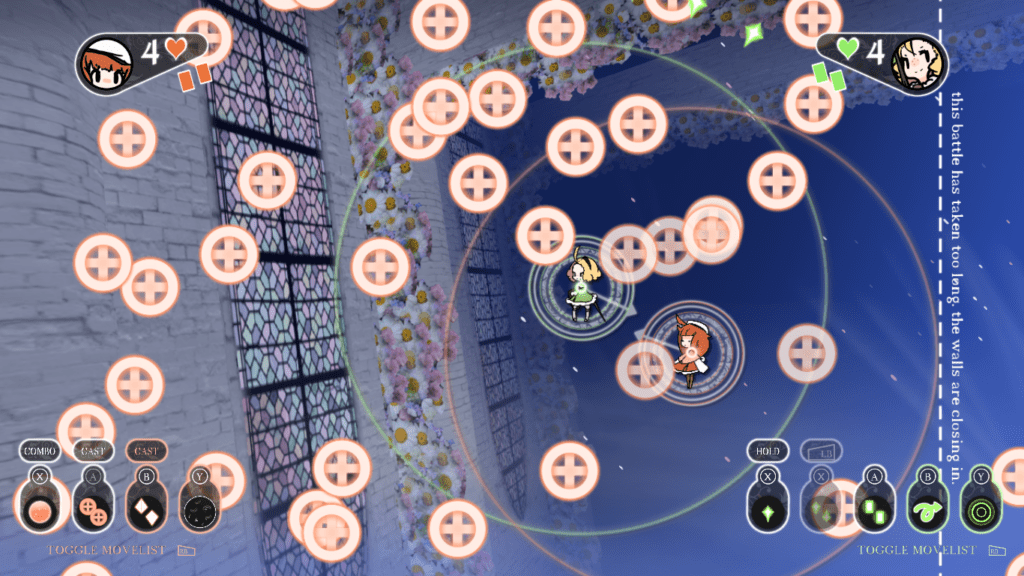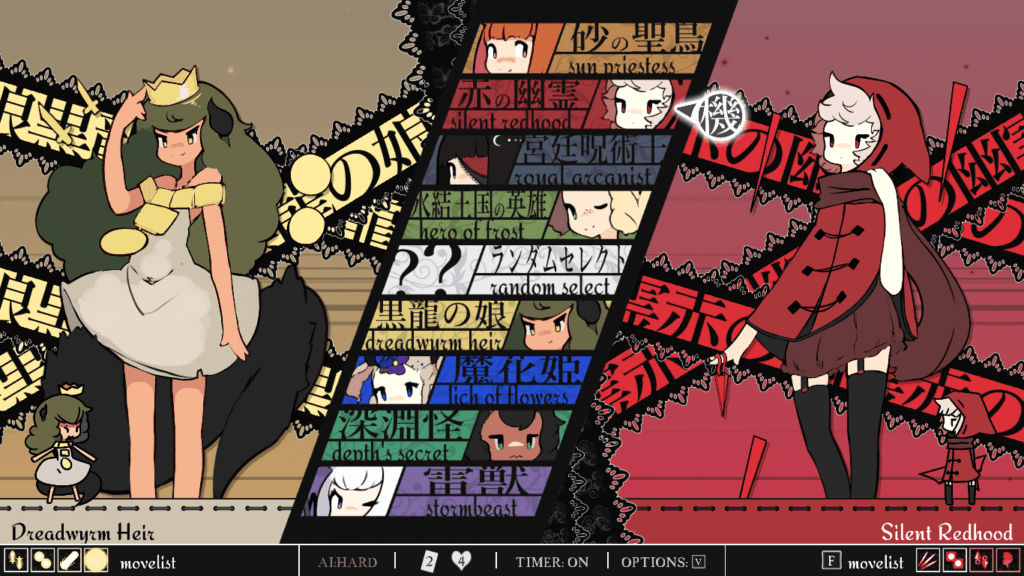There’s not much in competitive gaming which compares to rush of one on one duels. As showcased prominently by the wildly popular fighting game genre, battling it out with another person in a test of mental conditioning and mechanical skill where every flick of a joystick and press of a button could be the match’s turning point is loads of fun to both play and watch. I actually found today’s title through my fighting game connections and while it scratched that competitive itch it also provided a wholly different experience from my usual fare and I’d like to share my thoughts on it.

Developed by only a single developer named Mino_Dev (plus a musician and a sound designer), Maiden and Spell is an indie 1v1 bullet battling game released February 5th, 2020 for PC via Steam. The premise is about a group of adventurer heroines descending into a dangerous dungeon and fighting their way through the anthropomorphized monsters living there (and occasionally against each other) to find a valuable treasure. The duels constitute the entirety of the player’s interaction with the game.
The game’s mechanics are effectively a competitive spin on the “bullet hell” genre. Each player has a basic attack designed to hit players who stand still, a wide attack that punishes careless movement, and two powerful skills with noticeable cooldowns, typically one offensive and one defensive. First player to win enough rounds wins the match. Most of the bullets travel slower than one would think, and players are able to fill the screen with dozens of projectiles at one time. From a viewer or a beginner’s perspective it might come off as a chaotic mess of attacks which takes a degree in nuclear physics to master. I have discovered, however, it is actually a game about learning to focus mostly on avoiding the bullets you perceive as threatening your decidedly tiny hitbox and using defensive tools when your efforts begin to fail, all while orchestrating your own hail of attacks to corner your opponent. There’s definitely a learning curve to it, but once you get the basics down it’s rewarding to see yourself find a sense of calm amid the colorful storm and squeeze through the most unlikely of gaps between attacks. The one weakness of this battle system is while it is certainly impressive to witness high-level play, it’s not as easy to spectate as other competitive titles.

No battling game is satisfying without interesting characters to play as though, and Maiden and Spell delivers. The eight character roster might seem pitiful in a post-Smash Ultimate world, but this mindset ignores that a tighter roster often leads to better balance and stronger character identity. Each of the game’s magical marksmen utilize wildly different fighting styles, making each character and match-up a game in itself. The Hero of Frost for example prefers to catch opponents off guard in relentless close-range mixups, and has two defensive specials instead of an offensive one to help mitigate the risks of fighting closer to the barrel of the enemy’s metaphorical gun. This is completely different from the Silent Redhood, who locks down foes in clusters of stationary traps in order to gain distance and unleash delayed attacks with superior range. Needless to say, the variety is great and finding a favorite is easier than the compact roster might imply. My favorite is the Sun Priestess, who floods the battlefield with halos and manipulates the enemy mage’s position with lock-on bursts of sunlight to set up her devastating and difficult to dodge offensive special.
Aside from the battles in versus mode, the arcade-like story mode also features computer opponents whose final life per round triggers super powerful Magus Attacks, which while never encountered in versus mode are great for developing that battlefield calm and testing your pattern recognition. These arcade modes are fixed for each character too, so the developer had the freedom to design Magus Attacks that teach you helpful strategies if you pay attention. The most obvious example being how Sun Priestess’ duel against the Royal Arcanist shows how the former’s defensive special removes the latter’s status effects. The one complaint here is that there are only stories for the adventurer characters (and two unlockable superbosses), which while narratively appropriate means that players who enjoy the monster characters don’t really have the luxury of using this mode to practice strategies for their fighter.
Speaking of the story, it’s definitely the weakest part of Maiden and Spell. It aims to tell a mostly light hearted story about uncovering the mysteries of the dungeon and poking fun at fantasy video game conventions, and in this regard it does a fine job. However there are definitely a few noticeable issues I have with the plot, though these mostly involve spoilers so I can’t say much. Let me just say that a certain character, once you see her story fleshed out, has a few unfortunate implications regarding her involvement in the events, and sadly there’s too much ambiguity in the world’s internal logic for me to resolve these concerns. Perhaps it’s the sort of thing only a thematic overthinker like me would notice, but I had to bring it up. On a significantly less interpretive note, the game also pulls from its magical girl inspirations in ways that harm the game’s aesthetic. Namely, there are two magical girl transformation sequences which utilize the “form-fitting glitter” effect made popular by the genre, and aside from being obviously indecent they stick out in a game which uses cute and elegant appeal over sensual appeal in basically every other facet of its presentation.
On a more positive note, I’d like to highlight how great the game’s character design is. I’m a sucker for character design that tells you a lot about the characters and story without any words, and Maden and Spell manages to tell you so much just by dressing the adventurers in warm outfits and the monsters in cool outfits. This dichotomy visually makes the two parties opposed to one another, gives the monsters a more wild look and the heroines a civilized air, and even contrasts the mostly simple and open motivations of the monsters against the mostly reserved and secretive adventurers. The graphics in general are simple, but pleasing to the eye and do an almost perfect job of communicating information needed to navigate its battles. Battlefields are endlessly in motion to keep the energy up, and certain notifications and UI elements include bold Japanese lettering to pay homage to the game’s anime inspirations. Just be careful when using alternate character colors, because the default colors are meticulously chosen to be readable against all other default colors, but certain combinations of alternate and default colors might for example cause both players’ projectiles to become green and make the game a lot harder. The game’s music is also enjoyable, consisting of lively pieces which accentuate the battles without disrupting your all-important focus.

So in conclusion, Maiden and Spell is a fun and engaging game with good aesthetic sense and duels that rival the best competitive fighters when learned. Its story might have been too simple for its own good, but otherwise this is a polished game with lots to discover from a mechanical standpoint. If you’re looking for a different kind of competition with your gaming friends, give this affordable little indie gem a try and it might surprise you.
Oh, and it has rollback netcode for online play, making it great if you happen to still be in lock down.
Scoring: 80%
Gameplay: 5 / 5
Art and Graphics: 4 / 5
Music : 4 / 5
Story 2 / 5
Replayability: 5 / 5
Morality/Parental Warnings
As mentioned in the review there are the “magical girl transformation” sequences which are quite sexualized. Monster character designs show a decent amount of skin, albeit the game’s artstyle limits sensual effect. As the title of the game implies, the characters are magicians and battle each other using magic spells. The battles come off as cartoon violence more than anything. One of the characters is described as a litch, a kind of zombie-mage in fantasy fiction, albeit she doesn’t look the part. Some of the Magus Attacks have names which make reference to pagan Norse mythology. There are two brief moments where one of the characters unexpectedly and nonconsensually kisses another character. Online interactions come with the usual cautions.
